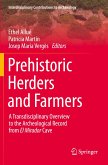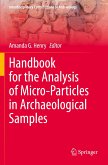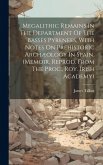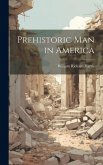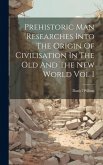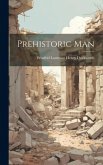Prehistoric Herders and Farmers
A Transdisciplinary Overview to the Archeological Record from El Mirador Cave
Herausgegeben:Allué, Ethel; Martín, Patricia; Vergès, Josep Maria
Prehistoric Herders and Farmers
A Transdisciplinary Overview to the Archeological Record from El Mirador Cave
Herausgegeben:Allué, Ethel; Martín, Patricia; Vergès, Josep Maria
- Gebundenes Buch
- Merkliste
- Auf die Merkliste
- Bewerten Bewerten
- Teilen
- Produkt teilen
- Produkterinnerung
- Produkterinnerung
This book presents an interdisciplinary study of the El Mirador cave located on the Atapuerca karstic system, one of the longest Pleistocene and Holocene archaeopaleontological deposits in Iberia. This book presents the results including new unpublished and published data to discuss different aspects related to the prehistoric herders and farmers that occupied this territory.
Divided into four parts, the book covers site presentation and the paleoenvironmental reconstruction covering a chronological span between 7060 ± 40-3040 ± 40 yrs. The history of the excavation and the excavation…mehr
![Prehistoric Herders and Farmers Prehistoric Herders and Farmers]() Prehistoric Herders and Farmers74,99 €
Prehistoric Herders and Farmers74,99 €![Handbook for the Analysis of Micro-Particles in Archaeological Samples Handbook for the Analysis of Micro-Particles in Archaeological Samples]() Handbook for the Analysis of Micro-Particles in Archaeological Samples44,99 €
Handbook for the Analysis of Micro-Particles in Archaeological Samples44,99 €![Megalithic Remains In The Department Of The Basses Pyrenees, With Notes On Prehistoric Archæology In Spain. (memoir, Reprod. From The Proc., Roy. Iris Megalithic Remains In The Department Of The Basses Pyrenees, With Notes On Prehistoric Archæology In Spain. (memoir, Reprod. From The Proc., Roy. Iris]() Megalithic Remains In The Department Of The Basses Pyrenees, With Notes On Prehistoric Archæology In Spain. (memoir, Reprod. From The Proc., Roy. Iris30,99 €
Megalithic Remains In The Department Of The Basses Pyrenees, With Notes On Prehistoric Archæology In Spain. (memoir, Reprod. From The Proc., Roy. Iris30,99 €![Prehistoric man in America Prehistoric man in America]() William Richard HarrisPrehistoric man in America35,99 €
William Richard HarrisPrehistoric man in America35,99 €![The Cursus Enigma The Cursus Enigma]() David SaundersThe Cursus Enigma57,35 €
David SaundersThe Cursus Enigma57,35 €![Prehistoric Man Researches Into The Origin Of Civilisation In The Old And The New World Vol I Prehistoric Man Researches Into The Origin Of Civilisation In The Old And The New World Vol I]() Daniel WilsonPrehistoric Man Researches Into The Origin Of Civilisation In The Old And The New World Vol I42,99 €
Daniel WilsonPrehistoric Man Researches Into The Origin Of Civilisation In The Old And The New World Vol I42,99 €![Prehistoric Man Prehistoric Man]() Wynfrid Laurence Henry DuckworthPrehistoric Man35,99 €
Wynfrid Laurence Henry DuckworthPrehistoric Man35,99 €-
-
-
Divided into four parts, the book covers site presentation and the paleoenvironmental reconstruction covering a chronological span between 7060 ± 40-3040 ± 40 yrs. The history of the excavation and the excavation methodology is detailed in this part including new unpublished recording techniques using 3D scanning and photogrammetry and a very meticulous sampling strategy. The book presents formation processes of the deposit which are key to understanding the successive occupations of the caves regarding its use as sheepfold cave as well as human remains that are part ofdifferent funerary contexts in the cave. In the last section, the book covers material culture found in the cave including lithic tools and pottery. This interdisciplinary work is of interest to scholars in anthracology, zooarchaeology, paleoanthropology, lithic technology, and experimental archaeology.
- Produktdetails
- Interdisciplinary Contributions to Archaeology
- Verlag: Agència de Gestió d'Ajuts Universitaris i de Recerca / European Regional Development Fund / Minister
- Artikelnr. des Verlages: 978-3-031-12277-4
- 1st ed. 2022
- Seitenzahl: 416
- Erscheinungstermin: 21. Oktober 2022
- Englisch
- Abmessung: 241mm x 160mm x 28mm
- Gewicht: 787g
- ISBN-13: 9783031122774
- ISBN-10: 3031122771
- Artikelnr.: 64235408
- Herstellerkennzeichnung
- Books on Demand GmbH
- In de Tarpen 42
- 22848 Norderstedt
- info@bod.de
- 040 53433511
- Interdisciplinary Contributions to Archaeology
- Verlag: Agència de Gestió d'Ajuts Universitaris i de Recerca / European Regional Development Fund / Minister
- Artikelnr. des Verlages: 978-3-031-12277-4
- 1st ed. 2022
- Seitenzahl: 416
- Erscheinungstermin: 21. Oktober 2022
- Englisch
- Abmessung: 241mm x 160mm x 28mm
- Gewicht: 787g
- ISBN-13: 9783031122774
- ISBN-10: 3031122771
- Artikelnr.: 64235408
- Herstellerkennzeichnung
- Books on Demand GmbH
- In de Tarpen 42
- 22848 Norderstedt
- info@bod.de
- 040 53433511


